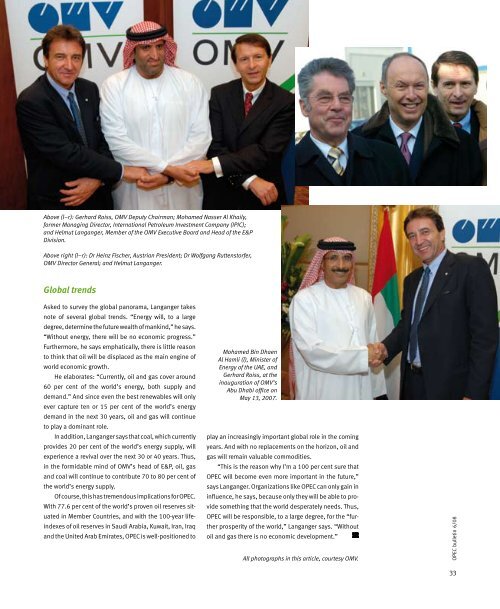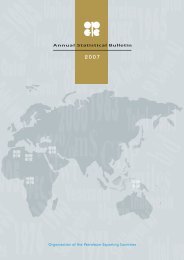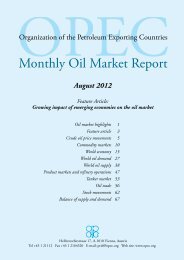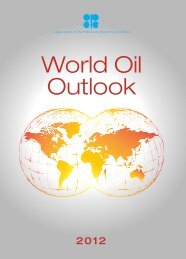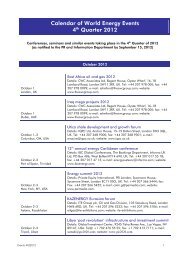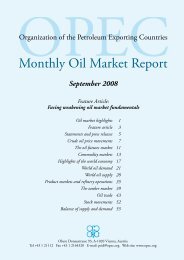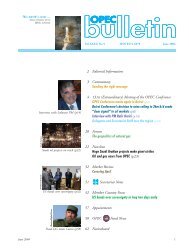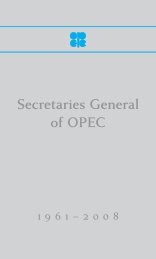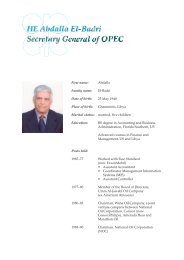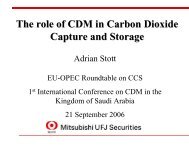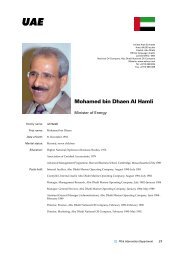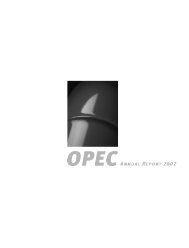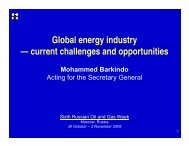You also want an ePaper? Increase the reach of your titles
YUMPU automatically turns print PDFs into web optimized ePapers that Google loves.
Above (l–r): Gerhard Roiss, OMV Deputy Chairman; Mohamed Nasser Al Khaily,<br />
former Managing Director, International Petroleum Investment Company (IPIC);<br />
and Helmut Langanger, Member of the OMV Executive Board and Head of the E&P<br />
Division.<br />
Above right (l–r): Dr Heinz Fischer, Austrian President; Dr Wolfgang Ruttenstorfer,<br />
OMV Director General; and Helmut Langanger.<br />
Global trends<br />
Asked to survey the global panorama, Langanger takes<br />
note of several global trends. “Energy will, to a large<br />
degree, determine the future wealth of mankind,” he says.<br />
“Without energy, there will be no economic progress.”<br />
Furthermore, he says emphatically, there is little reason<br />
to think that oil will be displaced as the main engine of<br />
world economic growth.<br />
He elaborates: “Currently, oil and gas cover around<br />
60 per cent of the world’s energy, both supply and<br />
demand.” And since even the best renewables will only<br />
ever capture ten or 15 per cent of the world’s energy<br />
demand in the next 30 years, oil and gas will continue<br />
to play a dominant role.<br />
In addition, Langanger says that coal, which currently<br />
provides 20 per cent of the world’s energy supply, will<br />
experience a revival over the next 30 or 40 years. Thus,<br />
in the formidable mind of OMV’s head of E&P, oil, gas<br />
and coal will continue to contribute 70 to 80 per cent of<br />
the world’s energy supply.<br />
Of course, this has tremendous implications for <strong>OPEC</strong>.<br />
With 77.6 per cent of the world’s proven oil reserves situated<br />
in Member Countries, and with the 100-year lifeindexes<br />
of oil reserves in Saudi Arabia, Kuwait, Iran, Iraq<br />
and the United Arab Emirates, <strong>OPEC</strong> is well-positioned to<br />
Mohamed Bin Dhaen<br />
Al Hamli (l), Minister of<br />
Energy of the UAE, and<br />
Gerhard Roiss, at the<br />
inauguration of OMV’s<br />
Abu Dhabi office on<br />
May 13, 2007.<br />
play an increasingly important global role in the coming<br />
years. And with no replacements on the horizon, oil and<br />
gas will remain valuable commodities.<br />
“This is the reason why I’m a 100 per cent sure that<br />
<strong>OPEC</strong> will become even more important in the future,”<br />
says Langanger. Organizations like <strong>OPEC</strong> can only gain in<br />
influence, he says, because only they will be able to provide<br />
something that the world desperately needs. Thus,<br />
<strong>OPEC</strong> will be responsible, to a large degree, for the “further<br />
prosperity of the world,” Langanger says. “Without<br />
oil and gas there is no economic development.”<br />
All photographs in this article, courtesy OMV.<br />
<strong>OPEC</strong> bulletin 6/08<br />
33


